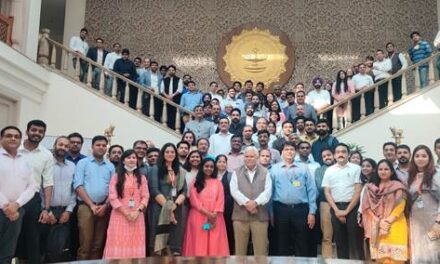Some 15%-20% of the world’s population is neurodivergent, encompassing conditions such as autism, dyslexia, Tourette syndrome, and ADHD. Neurodivergent individuals often face barriers in the workforce due to their unique strengths and challenges in learning, social engagement, and task completion. Interestingly, research suggests that neurodivergent individuals may be overrepresented in STEM fields, including medicine. This is attributed to traits often associated with neurodivergent conditions, such as hyperfocus, pattern recognition, increased curiosity and empathy, and quick thinking under pressure.
Despite these strengths, neurodivergent physicians frequently encounter significant difficulties within the healthcare field. They grapple with stigma, a culture of nondisclosure, and a lack of accommodations, leading to burnout and poor mental health. “The medical system and the mental health system are some of the spaces that are holding on tightly to some of the outdated understandings of things like autism and ADHD,” says Megan Anna Neff, PsyD, a psychologist with autism and ADHD based in Portland, Oregon.
A 2023 survey of over 200 autistic doctors from various countries found that 77% had considered suicide, and 24% had attempted it. Nevertheless, many neurodivergent doctors believe their unique ways of thinking and creativity can greatly benefit the field. They advocate for a more inclusive medical environment and better understanding of how neurodivergent physicians’ brains work to allow them to thrive.
Blending In and Breaking Down
The exact number of neurodivergent physicians in the workforce is unknown, with existing studies focusing mainly on autism. Researchers believe the percentage could be higher than reported, as neurodiversity is often underidentified. Autism, for example, can be diagnosed as early as 18 months, but many receive their diagnosis much later in life. Dr. Melissa Houser, a primary care physician diagnosed with autism in 2021, exemplifies this trend. She explains that her diagnosis came amidst autistic burnout, a common consequence of chronically exceeding one’s capacity to meet life’s demands.
Houser, who also has ADHD and dyslexia, describes her experience working in a traditional practice setting. Over time, she faced intense dysregulation and fatigue, leading to communication difficulties and burnout. Unable to “mask” her neurodivergent traits, Houser’s situation deteriorated until she sought psychiatric help and ultimately founded All Brains Belong, a nonprofit providing neurodiversity-affirming medical care, education, and advocacy.
Research has shown that autistic individuals are at increased risk for physical health conditions, including immune and gastrointestinal disorders, metabolic conditions, and increased mortality in hospital settings. Understanding these connections, says Houser, can “mean the difference between life and death” for neurodivergent patients. However, a 2015 study found that many healthcare providers lacked the skills and tools to recognize and care for patients with autism spectrum disorder.
Different as a Doctor and a Patient
Dr. Bernadette Grosjean, a retired associate professor of psychiatry and a distinguished Fellow of the American Psychiatric Association, received her autism diagnosis at 61. She reflects on her lifelong experiences and how they shaped her career and personal life. Grosjean noted that many women she treated for borderline personality disorder were autistic, prompting her to question and eventually understand her own neurodivergent traits.
Grosjean discovered Autistic Doctors International, a group of over 800 autistic doctors worldwide, where she found a sense of belonging and now serves as the US lead for psychiatry. Research indicates that autism and ADHD are frequently misdiagnosed as depression or anxiety, further complicating the experiences of neurodivergent individuals in the medical field.
Neff, who discovered her autism after her child was diagnosed, highlights the challenges of fitting into the traditional medical space. She found it difficult to adhere to short appointment windows and concise note-taking, which led to burnout.
A Deficit-Based Lens
Houser argues that autism is often viewed through a “deficit-based lens,” with stressors like sensory overload and changes in routine exacerbating behavioral challenges. The DSM-5 criteria for autism are largely based on autistic “stress behaviors,” leading to misjudgment of neurodivergent doctors’ capabilities.
Neff describes medicine as a “sensory overwhelming work environment,” often resulting in physical symptoms from sensory overload. Fearful of invalidation, Neff waited until she was in private practice to disclose her neurodivergence.
Understanding the Neurodivergent Brain
Lack of education on neurodivergent brains means these physicians are often not recognized for their potential with accommodations. Houser emphasizes that autistic brains are systems-thinking pattern matchers, which can be advantageous in medical practice. Catriona McVey, a medical student and creator of the blog Attention Deficit Doctor, points out that ADHD brains are driven by interest and can hyperfocus on tasks they enjoy.
Empathy, a crucial aspect of medical practice, is often misunderstood in neurodivergent individuals. Research challenges the stereotype of neurodivergent people lacking empathy, instead highlighting the “double empathy problem,” which differentiates between emotional and cognitive empathy.
Support Can Lead to Success
The Americans with Disabilities Act requires employers to provide reasonable accommodations, but many neurodivergent physicians avoid disclosure due to fear of invalidation. Requesting accommodations can be a lengthy process, and service pressures often lead to refusals. McVey lists several helpful accommodations, including flexible working hours, quiet spaces for paperwork, dictation software, and extra time for exams.
Neurodivergent physicians advocate for increased diversity in senior leadership and cognitive apprenticeship models to improve understanding and support. However, interventions often come too late, only when a doctor is in crisis. Grosjean stresses the importance of listening to neurodivergent colleagues with an open mind to challenge stigma and misconceptions.
In conclusion, recognizing and supporting neurodivergent physicians can harness their unique strengths, benefiting the medical field and improving patient care. The question remains: “If not me, then who? If not now, then when?”












